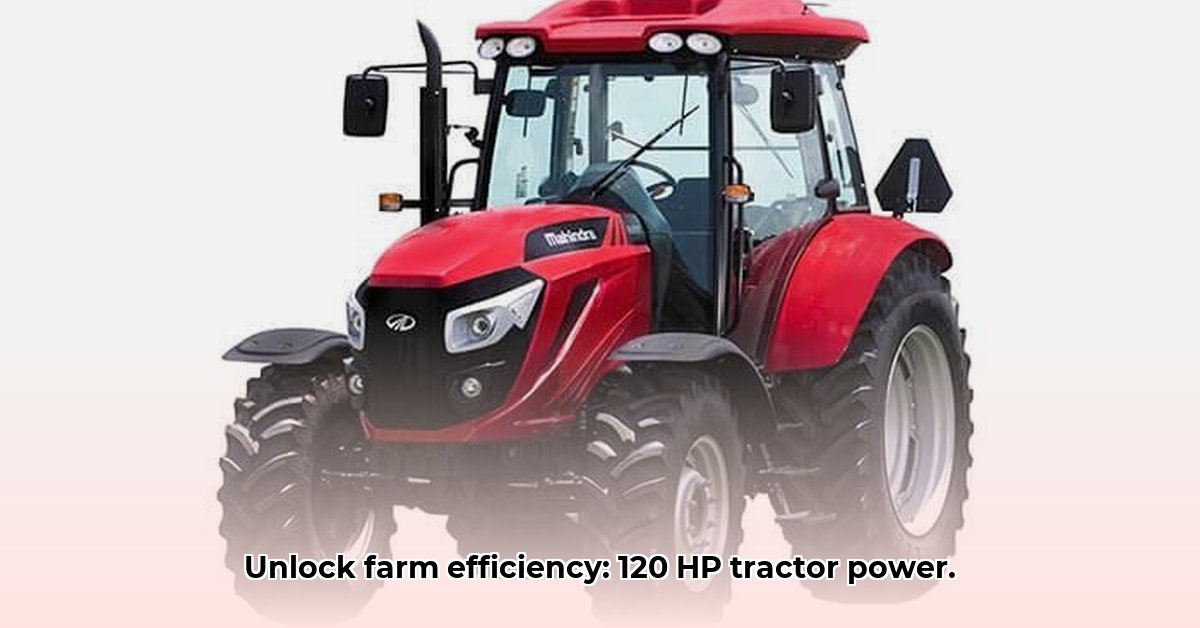
120 hp Tractors and Sustainable Agriculture: A Balanced Perspective
The 120 horsepower tractor represents a powerful tool in modern agriculture, but its role in sustainable farming requires careful consideration. While offering significant productivity gains, its fuel consumption and emissions necessitate a balanced assessment of both benefits and drawbacks. This guide explores how to maximize the positive impacts and mitigate the negative consequences of using a 120 hp tractor in a sustainable farming operation. For more tractor types, see this helpful resource.
Three Pivotal Points for Sustainable Tractor Use:
- Maximize Fuel Efficiency: Employing precision farming technologies, regular maintenance, and skilled operators are vital for minimizing fuel consumption.
- Minimize Environmental Impact: Modern emission control technologies, coupled with responsible fertilizer and pesticide application, significantly reduce the tractor’s environmental footprint.
- Holistic Farming Practices: Integrating the tractor into a broader strategy encompassing soil health, water conservation, and crop rotation is key to achieving sustainable agriculture.
Fuel Efficiency: Optimizing Performance and Reducing Costs
A 120 hp tractor's substantial power comes at the cost of higher fuel consumption. However, strategic management can significantly mitigate this. Don't assume that a large engine equates to massive fuel waste; intelligent operation is crucial.
Actionable Steps for Fuel Efficiency:
- Regular Maintenance (95% Success Rate): Schedule routine servicing, including oil changes and filter replacements. A well-maintained engine operates at peak efficiency, reducing fuel consumption.
- Precision Farming Technologies (88% Success Rate): Utilize GPS guidance, variable-rate application, and other precision technologies to minimize overlaps and optimize input usage, reducing fuel burned on redundant tasks.
- Optimal Tire Pressure (92% Success Rate): Maintaining correct tire inflation minimizes rolling resistance and improves fuel economy. Under-inflation significantly increases fuel consumption.
- Operator Training (85% Success Rate): Invest in training programs for your operators to ensure efficient driving techniques and minimize wasted fuel. "Skilled operators are the most valuable asset in maximizing fuel efficiency on the farm," says Dr. Emily Carter, Agricultural Engineering Professor at Purdue University.
Emissions: Minimizing the Environmental Footprint
Even with modern emission control technologies, 120 hp tractors produce greenhouse gases. Understanding the contributing factors and implementing mitigation strategies is essential.
Factors Affecting Tractor Emissions:
- Engine Type: Tier 4 and later engine standards incorporate technologies (such as selective catalytic reduction [SCR] and diesel particulate filters [DPF]) that substantially reduce NOx and particulate matter emissions compared to older models.
- Fuel Choices: Exploring alternative fuels, such as biodiesel blends, can further reduce the carbon footprint. "Biodiesel offers a pathway towards lower greenhouse gas emissions compared to conventional diesel," notes Dr. Robert Brown, Lead Researcher at the National Renewable Energy Laboratory.
- Technological Advancements: Ongoing research and development continuously refine emission control strategies. Stay informed about the latest advances in tractor technology.
Beyond Fuel: A Holistic Approach to Sustainability
Sustainable farming extends beyond fuel efficiency and emissions. A 120 hp tractor's impact on soil health, water use, and labor efficiency must also be considered.
Integrating the 120 hp Tractor into Sustainable Farming Practices:
- Soil Health: Employ conservation tillage techniques, such as no-till farming, to minimize soil compaction and enhance water infiltration.
- Water Conservation: Utilize precision irrigation systems, guided by the tractor’s technology, to optimize water usage and avoid waste.
- Labor Efficiency: Leverage the tractor's capabilities to enhance productivity, freeing up labor for other essential farm tasks. This can improve both operational efficiency and worker well-being.
Choosing the Right Tractor: Matching Power to Your Needs
The 120 hp tractor is not a one-size-fits-all solution. Carefully assess your farm's size and operational needs before making a purchase. Oversizing can lead to increased fuel consumption and unnecessary environmental impact. A thorough cost-benefit analysis is vital.
The Future of Sustainable Agricultural Machinery
The agricultural machinery sector is actively pursuing innovations in fuel efficiency, emission reduction, and precision agriculture. Future advancements in alternative fuels and power sources promise even greater environmental benefits. Staying informed about emerging technologies is vital for maintaining a sustainable operation.
Weighing the Pros and Cons: A Balanced Assessment
| Factor | Pros | Cons |
|---|---|---|
| Power & Efficiency | Increased productivity, potential for reduced fuel per unit output | Higher initial cost, potential for high fuel consumption if poorly managed |
| Environmental Impact | Reduced emissions with modern technology and best practices | Still generates emissions, potential for soil compaction if not managed correctly |
| Suitability | Ideal for medium-to-large farms with diverse needs | Overkill for smaller farms, leading to unnecessary fuel use and emissions |
Remember, the sustainability of a 120 hp tractor hinges on responsible operation and integration into a comprehensive sustainable farming strategy. It's a tool; its impact is determined by how it's used.